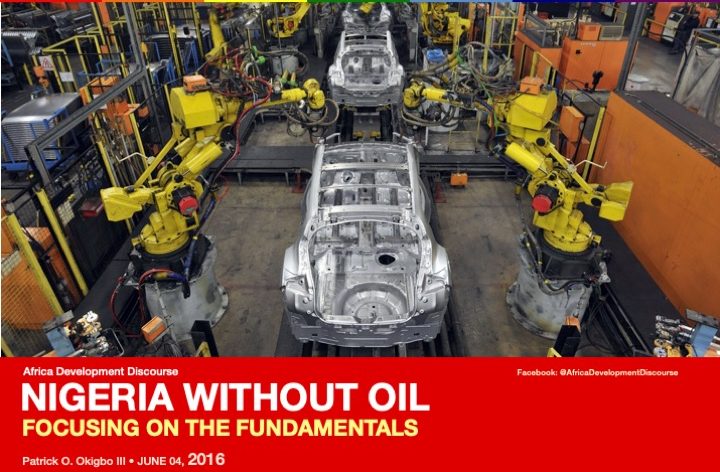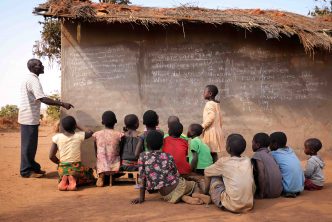Keynote speech presented by Patrick O. Okigbo III at the Patriots in Leadership and Service Awards of the People’s Democratic Party held on June 04, 2016, at the Shehu Musa Yar’Adua Centre, Abuja.
Permit me to tell you a story of a prodigal entity that squandered its wealth on frivolities and, now the music is over, it needs to decide on how best to return to the basics and ensure its very survival. There are no easy choices. The question, therefore, is whether Nigeria has what it takes to make big, difficult, decisions.
LET’S SHARE THE WEALTH
There are a few countries in the world that are as blessed as Nigeria. Only 8 countries have more arable land than Nigeria. The country has over 40 different types of precious minerals and floats on a sea of natural gas and crude oil. But for six countries, Nigeria has the largest population or domestic market. Almost in a bid to spite the rest of the world, in addition to all of the above resources, providence spared Nigeria from significant natural disasters.
But, on its own, Nigeria over time adopted a severely destructive strain of corruption. With the discovery of oil in commercial quantities, the country lost her thrift and discipline, and adopted prodigality. The World Bank estimates that over $400 billion of oil revenues has been stolen or misspent since 1960. Furthermore, Nigeria has received over $400 billion in aid. The combined amount is equivalent to twelve times what the United States spent on reconstructing the whole of Western Europe after World War II.
ARE WE IN THE PERFECT STORM?
But it appears the music may have stopped as Nigeria now finds itself in a perfect storm. There has been a significant decline in oil revenue, which accounts for over 80 percent of Nigeria’s budget. The Civil Services are largely unproductive and can’t think Nigeria out of its current economic malaise. The 1.2 million Nigerians who are not able to gain admission into universities every year remain semi-literate. The 0.5 million graduates who enter the labour market every year are not much better. Furthermore, Nigeria failed to invest in economic infrastructure when oil revenue gushed. It succeeded in creating a political class that spends more time scheming their way to the feeding trough and spares little thought to economic development or the improvement of the lives of its citizens.
In the face of these challenges, Nigeria’s gross domestic product dropped from a high of 7 percent over the last 10 years to negative 0.36 percent in Quarter 1 of 2016. By the end of June 2016, Nigeria will be officially in a recession. Nigeria will be in an economic recession as it prosecutes a war in the Northeast, potentially another war in the South-South, an expansion of the herdsmen-farmers conflict from the Middle Belt to the rest of the country, while Biafran agitators in the Southeast continue to rattle the cage.
Petroleum sector analysts estimate that price recovery to $100 a barrel will take over two decades. This puts Nigeria’s finances in a shambles. The situation is worsened by states that are proving to be economically unviable. Most of the states in Nigeria are unable to pay their staff salaries and continue to rely on bailouts from a Federal Government that may soon need a bailout. Everything seems to be falling apart: electricity, education, healthcare, transport infrastructure, security and the socio-economic indicators.
IS IT TIME TO GO HOME?
Like the biblical prodigal son, Nigerians realise that the country cannot continue on this trajectory of sub-optimal performance. The challenge, however, is how to decide on the most optimal options for Nigeria.
Most commentators propose the diversification of the economy away from an over-dependence on the petroleum sector. That is where the consensus ends.
The Nigerian economy is quite diversified with services contributing about 56 percent of the GDP, industry contributes about 24 percent, and agriculture contributes about 20 percent. The question, therefore, is how can Nigeria develop these sectors to increase their contributions to funding the budget? Petroleum revenue still contributes about 85 percent of the country’s revenue.
WHAT ARE THE OPTIONS?
There is enough prescriptive literature on the economic sectors Nigeria should focus on. The current administration is already prioritising agriculture, solid minerals, power sector, etc. The challenge with these recommendations is that there is usually no consensus on the economic objectives and methodology for selecting the sectors.
Late last year, principals from my firm, Nextier Advisory, were involved in an exercise to prioritize economic sectors in which Nigeria should promote foreign direct investment. We assumed that the government’s top priority is to create jobs for the millions of young Nigerians. This goal was gleaned from speeches and public pronouncements of the government. We used a methodology that evaluated 55 economic sub-sectors by attractiveness and feasibility. Attractiveness was measured using two parameters (size of the opportunity and impact on job creation) while feasibility was measured using Nigeria’s ability to compete against other countries in sub-Saharan Africa, and the ease of removing constraints to foreign direct investments. The result of the analysis was a bit surprising. The top five sectors were Business Process Outsourcing, Automotive, Cassava, Renewable Energy, and Packaging.
This is where the good news ends and the gory story begins.
Nigeria has always been very good at producing strategy documents but not necessarily good ideas. At Nextier, we define “good ideas” as those solutions that consider the opportunities as well as the obstacles to their full implementation. Most of Nigeria’s strategy documents do not focus enough effort on the reasons why we have been unable to implement most of the policies and programmes and how best to navigate the implementation challenges.
HOW DID WE GET HERE?
An Igbo adage states that one who does not know where the rain started beating one will not know where it stopped. If we do not seek to understand how Nigeria got into this mess in the first place, we will not figure out how to get out of it. So when did the wheels of Nigeria begin to wobble?
We can go back to 1914 and rest the blame at the feet of the colonialists but after 100 years, we would be challenged to find anyone who would truly agree with that assessment. We must cast our gaze much closer to the 1960s. Nigeria had the misfortune of military intervention only six years into self-rule. The military, which could be excellent at what it has been trained to do, is not the greatest candidate for nation-building. In the 28 years it ruled Nigeria, it appeared to wage a war against intellectualism and empowered apologists who did not understand the tenets of economic planning and nationbuilding. These apologists became the politicians of the post-military era. These politicians begot other politicians of their ilk and we have continued this dive to the bottom of anti-intellectualism. Today, what we have is a public space that is dominated by people who should have nothing to do with piloting the affairs of state. A good friend of mine put it quite succinctly, “those who speak for us today, are the ones who should sit with paper and pen in hand and simply take notes. Those who should speak have been chased away from the public space”. It is therefore not surprising that we are not able to marshal the intellectual power required to solve some of our most banal problems.
This lack of competence pervades Nigeria’s public service. The depth of the incompetence is staggering. Can our Civil Service deliver the policies, programmes, and implementation required to deploy the infrastructure that will support 480 million Nigerians by 2050? Can this Civil Service compete against a rising China and India? It is clear to any casual observer that we lack what it takes to pull Nigeria out of the current economic quagmire. At what point do we stop scratching with chickens and start soaring like eagles?
But after 17 years of civilian rule, we are wasting time casting the blame on the military. The blame has to rest squarely at the feet of the Peoples Democratic Party (PDP) that was in power for those years. While there is much to be celebrated in the economic reforms of the Obasanjo years that resulted in almost a decade of 7 percent GDP growth and the infrastructure development of the Jonathan years, there is much more that could have been achieved. It is the public service that will develop the policies and implement the programmes. A reform of the public service should have been a top priority for the PDP government.
LET’S RETURN TO THE BASICS
For Nigeria to be able to diversify its revenue base, it must create the impetus for reform, decide on the economic goals and enablers, prioritise the sectors, develop good ideas, focus on implementation, and manage the results.
— Impetus for reform –
We can’t assume that everyone understands that the cavorting is over. For instance, the State governments can’t pay salaries but we are yet to see any commitment to a fundamental restructuring of governance in those states. Remember that some state governors opposed the Sovereign Wealth Fund (in the name of opposition politics) and these same governors put pressure on the Federal Government to draw down from the Excess Crude Account even before the rainy day. Furthermore, it appears that the Labour Unions do not quite understand how bad things are and that is the reason why they still oppose efforts to reform or right-size the Civil Service.
— Economic goal(s) and enablers –
There are several complementary economic goals that the government can focus on: job creation, economic growth, income equality, quality of life, etc. However, there is a need to secure consensus and sequence these economic goals to agree on the optimal economic development strategies.
There are several enablers of a fully diversified revenue base for Nigeria. These enablers include governance structures for improved transparency and accountability, public service reforms, enabling economic infrastructure, etc. Take infrastructure, for instance, according to the National Integrated Infrastructure Master Plan, Nigeria needs $65 billion to meet its commitment to infrastructure development over the next five years. In all, Nigeria needs $2.9 trillion over the next 30 years.
— Prioritise the sectors –
Nigeria cannot invest in all her economic sectors. As a result, it must prioritise. This focus also helps with efforts to promote foreign direct investment to the sectors. This point is more apt given the steady decline in Foreign Direct Investments to Nigeria since 2012.
— Ideas –
The failure of Nigeria is the failure of the intelligentsia. The politicians are good at what they do; they win power by any means possible. The intellectual class has not been as effective. The intelligentsia should think through the challenges of implementation and present to the politician a plan that he or she can simply approve and facilitate implementation.
While Nigeria has a library of policy documents and strategies, the fact that these plans have not yielded the desired results is indicative that the ideas may not have been well-considered. These documents should have considered the evident challenges and proposed a way to sidestep and navigate them. Therefore, any ideas that are proposed today for diversifying Nigeria’s revenue base should be subjected to rigorous scrutiny and debate. They must be based on verifiable methodologies and data. Anything short of this is simply a work of great fiction and should be considered as such.
— Implementation –
The bitter nugget of truth is that Nigeria cannot implement. Our recent history shows that our human capital is not up to par. This assessment is not to castigate; rather, it is to highlight the need for a new approach to implementation. Dubai was a country of pearl divers when they discovered oil. Knowing that they lacked the human capital to deliver their vision, they bought the required experience and got the job done. We are getting to a point where we must consider such models. When I intend to shock my audience, I argue feverishly that we should outsource Nigeria to a foreign country or company, as we would realise better results that way. However, the fact is that we must dispassionately acknowledge that we have not been able to do the job and must seek new ways before it is too late. We cannot use the current implementation model to prepare for a country that will become the third most populous country in the world (480 million people) in three decades.
— Results –
It appears that what we have in Nigeria today is government by “strategic communications”. The government spends a lot of time celebrating what it plans to do and not what it has done. Government decisions should be driven by data, and not propaganda or politics.
A review of Nigeria’s Federal and State budgets shows a lot of projects that are funded without any assessment of performance or delivery. Every year, more funds are assigned to such programmes because they are already on the previous year’s budget without assessing their feasibility or measuring their impact. A nation that fails to measure and calibrate is bound to deliver sub-optimal results.
BRINGING IT TOGETHER
Ladies and gentlemen, the real question is not whether Nigeria is willing to diversify its revenue base because let’s face it, Nigeria does not have a choice but to diversify or else we will be like Venezuela in a few years. This is not the time to play partisan politics with this issue. This is not the time to be PDP or APC or XYZ. This is the time to be NGR – Nigerian.
Every Tomi, Dike, and Haruna must shelf his or her historical biases to realise that we are all in this Titanic together and it has already hit the iceberg. We can sit on the deck and twiddle our fingers, fight, pray, or hope that by some miracle the gaping hole with close up. Such miracles happen only on “Africa Magic”. Or we can roll up our sleeves, forget our differences, focus on our commonalities, and fight together because we will either win together or we will all die together.
Thank you very much for your attention.







